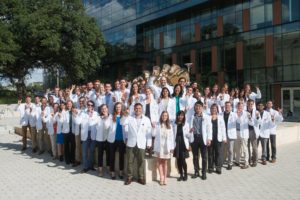
Dell Med’s first graduating class. Photo: Dell Medical School Facebook page
The Hogg Foundation for Mental Health is excited to announce that it has awarded a one-time grant of $60,000 to Dell Medical School at The University of Texas at Austin to support the school’s psychiatric first aid program for doctors, nurses, and other health care workers on the front lines of the COVID-19 pandemic in the greater Austin area.
Research from both the COVID-19 outbreak and from Toronto after the 2003 SARS epidemic found that frontline health care workers experience burnout, post-traumatic stress, severe depression and anxiety that lingers long after the crisis has passed. Experts anticipate a second pandemic of poor mental health resulting from COVID-19 stresses.
Under the direction of Dr. James Baker, Associate Chair of Clinical Integration & Services in the Department of Psychiatry and Behavioral Sciences, a Dell Medical School psychiatrist or social worker will offer evaluations and interventions to address emerging mental health needs, practical guidance on coping, and connection to ongoing services as needed. Services will be offered both on-demand and by appointment, and will be managed through a hotline service.
“More work, fear for safety and health, isolation, threats to livelihood, anxiety about the unknown—these are perilous times for health care workers,” said Dr. Octavio N. Martinez, Jr., executive director of Hogg Foundation and senior associate vice president for diversity and community engagement at The University of Texas at Austin. “With our support, Dell Medical is doing its part to head off a mental health crisis in the making.”
“This is a very difficult time for all of us but especially for health care workers who are traveling in unchartered waters in terms of the acuity of the patients they are treating, the concerns about infecting themselves and their families and the pain and suffering they are seeing on a regular basis in the family members of patients. I am delighted that the Department of Social Work worked closely with us in order to launch this program to help proactively anticipate the mental health needs of our health care community,” said Charles B. Nemeroff, MD, PhD, Chair of the Department of Psychiatry and Behavioral Sciences at the UT-Austin Dell Medical School.
